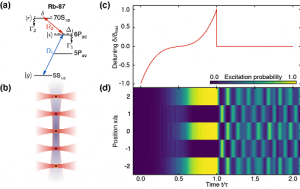Summary
Quantum simulators enable probing the static and dynamic properties of correlated quantum many-body systems that would otherwise be numerically inaccessible using classical simulators. We are developing quantum simulators based on arrays of neutral atoms excited to Rydberg states. Such Rydberg atom arrays are advantageous for simulating the dynamics of interacting spin systems (Ising spin models) in higher dimensions and arbitrary geometries. Our first simulator uses alkali atoms trapped in two-dimensional arrays of optical tweezers. It is currently being designed, built and operated by our team. It will be used for studying many-body quantum dynamics, non-equilibrium physics, and quantum chaos. We will explore these areas after optimizing our control gates and engineering interactions using coherent excitation to Rydberg states. We will also explore novel ideas presented by the early adopter community, such as approaches to gain better insight into advanced materials. Finally, as this project involves the development of novel quantum hardware, including an optimal control toolbox and advanced laser systems, it may lead to further application to quantum enhanced sensing and precision metrology.

Figure 1. Classical simulation of the dynamics of a chain of five interacting atoms exhibiting coherent many-body oscillations after being adiabatically driven across a phase transition from a disordered state into an ordered state and suddenly quenched into a far-from-equilibrium state. Quantum simulators enable extending those simulation results into numerically inaccessible regimes for larger system sizes and higher dimensions.
Related Content

Novel Infrared Camera Based on Quantum Sensors for Biomedical Applications
Summary In this project we develop a novel infrared camera with low noise and high detection efficiency for biomedical applications of optical coherence tomography (OCT) using quantum materials. OCT is a technique used to image the back of the eye and allow for the diagnosis of detrimental eye conditions, for e.g., macular degeneration, diabetic retinopathy […]
March 13, 2019

Quantum Dynamics of Cavity Interactions with Spin Ensembles
Summary High quality factor cavities can be powerful control elements for ensembles of spins, enabling unitary control as well as on demand cooling. They can also be used to couple two otherwise non-interacting ensembles. The goal of the project is to explore the physics and engineering of such systems both theoretically and experimentally. The laboratory contains a […]
September 7, 2016

Materials for Majorana-based Topological Qubits
Summary Topological qubits offer a novel pathway to scalable quantum computing by simultaneously allowing for ease of coupling between qubits and strong decoupling of qubits from noise and dissipation. The most promising direction explores the topologically induced protection of theoretically predicted exotic quasiparticles, the so-called Majorana Zero Modes or MZMs. To-date MZMs, which follow […]
January 28, 2019

Quantum Light Sources Based on Deterministic Photon Subtraction
Summary This project develops new sources of light that utilize quantum entanglement to enhance imaging resolution and detection. We aim to go beyond simple photon pairs and advance our understanding and control of new quantum states of light. Our approach uses deterministic single-photon subtraction (removing of a specific photon from a pulse of light) […]
July 13, 2018

